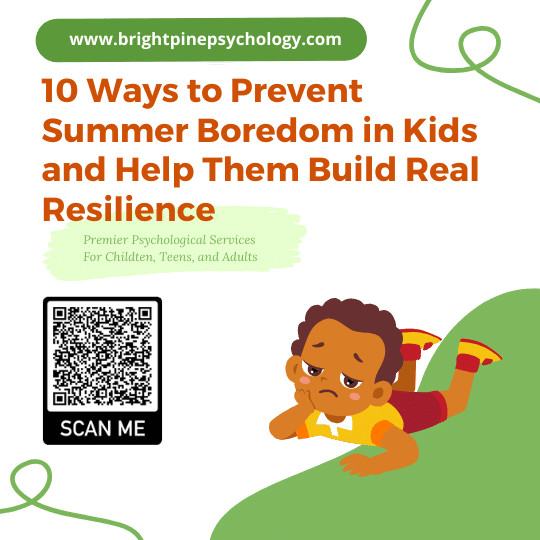
Table of Contents
10 Ways to Prevent Summer Boredom in Kids and Help Them Build Real Resilience
Boredom often arrives quickly when the school year ends and summer stretches out ahead. The excitement of freedom can give way to a familiar refrain: “I’m boooored.” It’s tempting to rush in with entertainment, schedules, or screens to fill the gaps. But here’s a powerful truth: boredom isn’t the enemy. In fact, learning to navigate it can be one of the most important developmental tools we give our kids.
Here’s how boredom can build resilience and how you can support your child through it:
1. Redefine Boredom as a Beginning
Boredom often signals the start of something creative or unexpected. When kids say they’re bored, they’re usually on the edge of figuring out what they want to do if we can resist the urge to rescue them too quickly. Try saying, “Sounds like your brain is ready to come up with something new,” and give them space.
2. Let Kids Practice Problem-Solving
Boredom presents a natural opportunity to make decisions and try new things. Whether it leads to building a fort, writing a comic book, or organizing a lemonade stand, the key is that they are driving the process. This sense of autonomy strengthens confidence and problem-solving skills.
3. Create a “Boredom Menu”
Instead of offering constant suggestions, work with your child to create a list of go-to activities they can choose from when boredom strikes. Include a mix of solo activities, creative outlets, physical movement, and even quiet rest. Hang the list somewhere visible so they can refer to it on their own.
4. Avoid Over-Scheduling
While camps and activities can be enriching, it’s also important to leave open time in the day. A fully booked summer can actually rob kids of the chance to build internal motivation and resilience. Think of unstructured time as a muscle; they need to use it to strengthen it.
5. Embrace the Discomfort (Even When It’s Loud)
Sometimes boredom sounds like whining or bickering—that’s normal. It can feel uncomfortable for both kids and parents. But allowing your child to sit in that discomfort without immediately filling the void helps them build tolerance for frustration and develop emotional endurance.
6. Model Curiosity
When you have down time, model curiosity and exploration. Read, tinker, doodle, or go for a walk. When kids see you engaging with the world (even in small, quiet ways) it gives them permission to do the same.
7. Encourage Exploration of Interests
Boredom can be the spark that pushes kids to dive deeper into a new or existing interest—like music, drawing, science experiments, or nature. Provide access to simple tools and resources (like library books, craft supplies, or safe kitchen ingredients) and see what captures their curiosity. This kind of self-guided exploration builds both creativity and confidence.
8. Introduce Mindfulness Moments
Sometimes kids feel bored because they’re overstimulated or unsure how to slow down. Simple mindfulness practices (like breathing exercises, listening to nature sounds, or guided relaxation) can help kids reconnect with the present moment. It may seem small, but learning to be still and self-aware is a quiet building block of resilience.
9. Rotate Toys and Materials
Kids can become overwhelmed or uninterested when everything is available all the time. Try putting some toys, books, or games away and rotating them every couple of weeks. This keeps things feeling fresh and encourages appreciation for what’s already at home, without having to buy anything new.
10. Make Space for Daydreaming
Not every moment needs to be productive or planned. Let your child stare out the window, lie in the grass, or simply “do nothing.” This unstructured, open-ended time allows their brains to rest, reset, and imagine. It’s in these quiet moments that creativity, insight, and emotional resilience often take root.
Final Thought: Boredom Is a Gift in Disguise
Though it may not feel like it in the moment, every “I’m bored” is an invitation for growth. When kids learn they have the tools within themselves to fill the space, rather than needing it to be filled for them, they develop self-direction, grit, and creativity. In other words: resilience.
So the next time boredom pops up this summer, take a breath, offer a smile, and trust that something good might be just around the corner.


